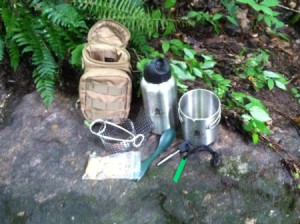Ever notice hernia bag (aka – Bug Out Bag) lists of essentials items to pack to get you through a 72 hour crisis. With only half that stuff in your bag, you’ll need a mule to get where you’re going.
We depend on modern modes of transportation – planes, trains, and cars. That’s a blessing and a curse. Even if vehicles are operational during an SHTF evacuation, roads become long parking lots. Then what? You and your family will be forced to use the oldest form of human locomotion… your feet.
Now…
Can you actually hump that 83.7 pound pack?
The fact that you’ve got a B.O.B. or Get Home Bag packed puts you light years ahead of the general population. Conveyance is the big issue though. The not-so-distant past proves that mayhem follows disaster in urban areas. If you’re trapped in the horde of humanity exiting cities, you need to lighten your load.
The must-have list below assumes you’ve been Doing the Stuff with your tools of survival. Be mindful that the added stress of a survival scenario makes the learning curve steep. Before an event is the perfect time to trade theory for action. Put on your Mike Rowe outfit and get dirty practicing your survival skills.
The number one way to increase your survivability is to always carry items that are difficult or impossible to reproduce in a crisis. At a bare minimum, every kit you pack should enable you to cut stuff, burn stuff, cover stuff, carry stuff, and tie stuff.
Cut Stuff
Ah, the good ol’ survival knife. Which is better, a 5 inch blade or the tricked out 12 inch Rambo version? Nothing gets feathers ruffled in the self-reliance community like a knife discussion.
I’ll put an end to the debate here and now. The best survival knife is the one in your hand.
The cutting tool is the hardest item to re-create in a survival situation. If a SAK (Swiss Army Knife) is all you have with you, guess what, it just became your survival knife. My SAK never leaves my pocket and sees more daily duty than any other knife I own. However, if I were limited to only one knife in a survival scenario, I’d choose a multi-tasking blade with these characteristics:
- Size: Fixed blade that measures 5 to 6 inch with a pointed tip. 10 to 12 inches overall length.
- Metal Content: Carbon steel is easy to hone and throws sparks with flint.
- Spine: A 90º edge on the spine is essential when making fire with a ferro rod. You can use the cutting edge on a ferro rod in dire emergencies but you lose a valuable resource – a sharpened edge.
- Full Tang: Partial (rat-tail) tangs are not as durable and more likely to fail/break with heavy use. Full tang knifes have solid metal the width and length of the handle.
- Functional: Should be able to perform detailed carving tasks, process fire wood, skin game and filet fish, food prep, shelter building, and self-defense. Your knife should fit comfortably in your hand.
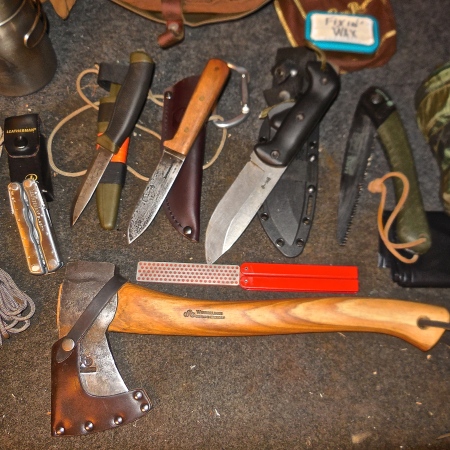
Burn Stuff
Pack several fire starting methods in your kit. Fire equals life. Don’t mess around with fire making. Redundancy is the key.
- Cigarette Lighter: This is an obvious one that has bailed me out many times.
- Fire Starter: Fatwood, charred material in a char tin, commercial fire starters, flint and steel, ferrocerium rod, DiY waxed jute twine, steel wool and 9v battery stored separately, and a magnifying lens.
- Primitive Fire: Friction fire methods take skill to master – and can still fail. Always carry other fire options.
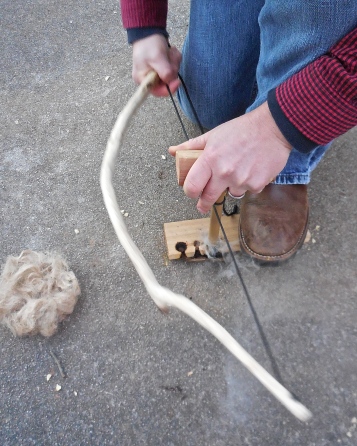
Cover Stuff
Burning precious calories to erect a natural shelter might be necessary if you’re caught unprepared. A simple, lightweight, waterproof covering to protect against the elements is easy to pack and affordable.
- USGI Poncho: These can be worn over clothing and gear and used as a tarp shelter.
- Contractor Trash Bag: Makes an emergency ground cloth or covering for your body.
- Emergency Space Blanket: Invest in a quality space blanket that will extend its usefulness to more than a couple of nights.
- Tarp: You don’t have to spend a fortune for emergency shelter. A cheap poly tarp from Wally World can get you through an emergency.
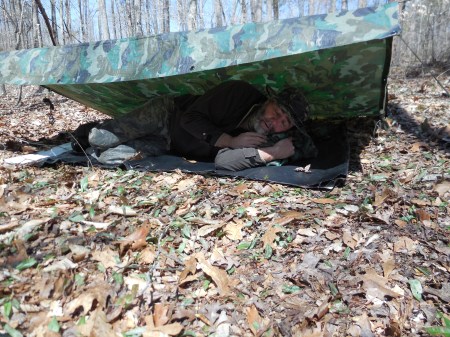
Carry Stuff
Plastic water bottles are better than no container. But they have limitations. Their not very useful for boiling water or cooking over a fire. I like stainless steel water bottles for their durability and resilience. Bottles that nest inside a cup are easy to pack and give you two containers without losing space in your kit.
Stainless Steel: Heavy duty, multi-tasker. Here’s my preferred container.
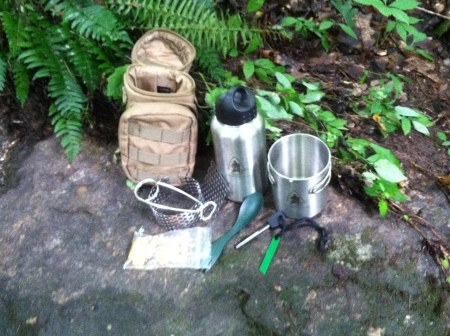
- Aluminum: Choose hard anodized aluminum if possible. I avoid aluminum for health concerns – but would use it to survive for sure!
- Titanium: Very lightweight but pricey.
Tie Stuff
Sure, you can make natural cordage with enough time and available resources. Time and resources are often scarce commodities. Processing plant fibers to make a ridge line for your shelter is a great skill to know and practice… but not when your life is in jeopardy. Commercially made cordage doesn’t take up much space or become a burden to carry.
- Paracord: 550 paracord contains seven individual braided strands within a nylon sheath making it a favorite among survivalists and campers. Interior strands can be removed and used for fishing line, sutures, snares, and other detailed survival needs. I pack 50 feet in each of our kits. But I prefer this next cordage…
- Tarred Bank Line: Another lightweight cord popularized in the survival community by Dave Canterbury. First used in the maritime world to preserve line and give extra bite to knots. We grew up using this cordage for trot lines and limb hooks on the Flint River. With 360 pound test strength (offered in other strengths), bank line was the only cordage I used to build my trapping shelter. Pack two 50′ hanks. Bonus – it’s cheaper than 550 cord.
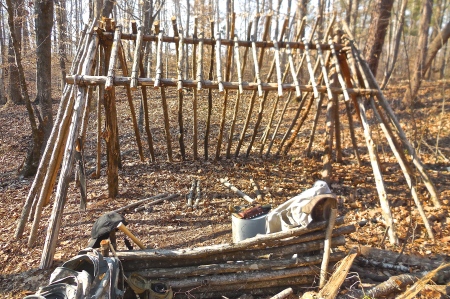
Emergencies are never planned. They just happen. Be prepared by packing these five essentials in all your kits.
Since I don’t own a pack mule (yet), I’m working towards increasing Skills to decrease Stuff in my kits!
How have you lightened your load?
Keep Doing the Stuff,
Todd

